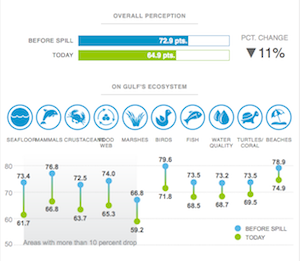WASHINGTON -- The Justice Department and five states on Monday announced a $20.8 billion final settlement of claims arising from the 2010 Deepwater Horizon oil spill in the Gulf of Mexico.
The final total is higher than the initial $18.7 billion settlement announced in July.
At either amount, it is the largest environmental settlement -- and the largest civil settlement with any single entity -- in the nation's history.
The deal, once approved by a judge, would resolve all civil claims against BP and end five years of legal fighting over the spill of 3̶1̶9̶,̶4̶7̶6̶ ̶b̶a̶r̶r̶e̶l̶s 3.1 million barrels* of crude, or 134 million gallons. It also would bind the company to a cleanup project in the Gulf Coast area aimed at restoring wildlife, habitat and water quality.
"BP is receiving the punishment it deserves, while also providing critical compensation for the injuries that it caused to the environment and the economy of the Gulf region," U.S. Attorney General Loretta Lynch said at a Justice Department news conference.
"The steep penalty should inspire BP and its peers to take every measure necessary to ensure that nothing like this can ever happen again," Lynch said.
The settlement, filed in federal court in New Orleans, finalizes an agreement first announced in July. The next steps are a 60-day public comment period and court approval.
In a statement, BP spokesman Geoff Morrell said the settlement total announced Monday includes amounts previously spent or disclosed by the company and "resolves the largest litigation liabilities remaining from the tragic accident."
Among other requirements, BP would have to pay $5.5 billion in Clean Water Act penalties and nearly $5 billion to five Gulf states: Alabama, Florida, Louisiana, Mississippi and Texas.
The company would also be required to pay $8.1 billion in natural-resource damages, with funds going toward Gulf restoration projects such as support for coastal wetland and fish and birds.
An additional $600 million would cover other costs, such as federal and state reimbursement claims. And up to $1 billion would go to local governments to settle claims for economic damage from the spill.
Gina McCarthy, the Environmental Protection Agency administrator, estimated that the final settlement represented $1,725 a barrel of oil spilled in the disaster. The maximum amount that a judge could have assessed in the case was $4,300 a barrel. A barrel contains 42 gallons.
"This pretty much puts a final stamp on the settlement, and the pain of the past five years can come to an end," said Iain Armstrong, a London-based oil sector analyst at Brewin Dolphin.
A coalition of conservation organizations, including the National Audubon Society and the Environmental Defense Fund, praised the settlement in a joint statement. The groups said that while the full damage of the oil spill may not yet be known, the process "will help bring the Gulf back to the state it was before the spill, and the release of this plan is a positive step toward that end."
The spill followed the April 2010 explosion on the Deepwater Horizon offshore rig that killed 11 workers. Oil gushed from the well for weeks before it was capped. The accident sparked thousands of lawsuits against BP and its contractors, Transocean, the rig owner, and Halliburton, which provided cementing services for the project.
BP earlier settled with people and businesses harmed by the spill, a deal that's so far resulted in $5.84 billion in payouts. Since the spill, BP has lost more than a third of its market value.
A report by Deepwater Horizon natural-resource trustees, created under the federal Oil Pollution Act, called the oil spill damages "unprecedented." They found that deep ocean water currents carried oil from the spill hundreds of miles from the blown-out well.
Oil from the spill was deposited onto at least 400 square miles of the seafloor and washed up onto more than 1,300 miles of shoreline from Texas to Florida. The oil was toxic to fish, birds, plankton, turtles and mammals, causing death and disease and making it difficult for animals to reproduce.
The EPA's McCarthy said that besides the toll on human life, "the spill drove Gulf communities into a period of painful uncertainty, forcing questions that no American family should ever have to ask: Is my food safe to eat? Is it dangerous for my kids to play near the shore? Is the air still clean to breathe? And will my businesses ever recover?"
Information for this article was contributed by Eric Tucker, Rebecca Santana and Janet McConnaughey of The Associated Press, Coral Davenport and John Schwartz of The New York Times and by Rakteem Katakey, Del Quentin Wilber and Margaret Cronin Fisk of Bloomberg News.
Business on 10/06/2015
*CORRECTION: The Deepwater Horizon oil spill in 2010 released 3.1 million barrels of oil, or 134 million gallons, into the Gulf of Mexico. The number of barrels was incorrect in an earlier version of this article that ran in Tuesday's Democrat-Gazette.
